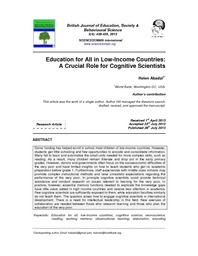
ATTENTION: The works hosted here are being migrated to a new repository that will consolidate resources, improve discoverability, and better show UTA's research impact on the global community. We will update authors as the migration progresses. Please see MavMatrix for more information.
Show simple item record
| dc.contributor.author | Abadzi, Helen | |
| dc.date.accessioned | 2014-07-03T21:32:35Z | |
| dc.date.available | 2014-07-03T21:32:35Z | |
| dc.date.issued | 2013 | |
| dc.identifier.citation | Published in the British Journal of Education, Society & Behavioural Science Vol 3(4): 436- 455: 2013. | en_US |
| dc.identifier.issn | 2278 – 0998 | |
| dc.identifier.uri | http://hdl.handle.net/10106/24342 | |
| dc.description | The peer review history for this paper can be accessed here: http://www.sciencedomain.org/review-history.php?iid
=244&id=21&aid=1761 | en_US |
| dc.description.abstract | Donor funding has helped enroll in school most children of low-income countries. However, students get little schooling and few opportunities to encode and consolidate information. Many fail to learn and automatize the small units needed for more complex skills, such as reading. As a result, many children remain illiterate and drop out in the early primary grades. However, donors and governments often focus on the socioeconomic difficulties of the very poor and have limited insights on how to teach students who get no academic preparation before grade 1. Furthermore, staff experiences with middle class schools may promote complex instructional methods and raise unrealistic expectations regarding the performance of the very poor. In principle cognitive scientists could provide technical assistance and conduct research on issues relevant to learning for the very poor. In practice, however, essential memory functions needed to explicate the knowledge gaps have little value added in high income countries and receive less attention in academia. Few cognitive scientists are sufficiently exposed to them, while education faculties similarly do not teach them. The question arises how to engage cognitive scientists in international development. There is a need for intellectual leadership in this field. New avenues of collaboration are needed between those who research learning and those who plan the education of the very poor. | en_US |
| dc.language.iso | en_US | en_US |
| dc.publisher | Sciencedomain International | en_US |
| dc.rights | © 2013 Abadzi; This is an Open Access article distributed
under the terms of the Creative Commons Attribution License (http://creativecommons.org/licenses/by/3.0), which permits unrestricted use, distribution, and reproduction in any medium, provided the original work is properly cited. | en_US |
| dc.subject | Cognitive sciences | en_US |
| dc.subject | International education | en_US |
| dc.subject | Perceptual learning | en_US |
| dc.title | Education for All in Low-Income Countries: A Crucial Role for Cognitive Scientists | en_US |
| dc.type | Article | en_US |
| dc.publisher.department | Department of Curriculum and Instruction, The University of Texas at Arlington | en_US |
| dc.identifier.externalLinkDescription | The original publication is available at the article DOI. | en_US |
| dc.rights.license | Published in an open access journal | |
| dc.identifier.doi | http://dx.doi.org/10.9734/bjesbs | |
Files in this item
- Name:
- Education for all in low income ...
- Size:
- 287.5Kb
- Format:
- PDF
This item appears in the following Collection(s)
Show simple item record


